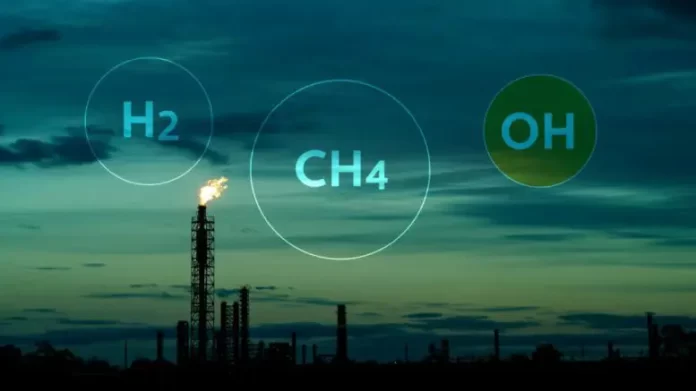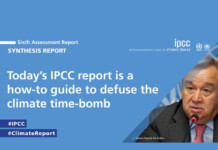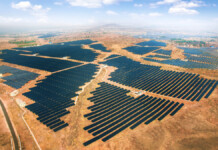When the world is going gung-ho about the possibility of hydrogen in green transition, new research shows it could be more harmful than fossil fuels as it releases more methane into the atmosphere.
Hydrogen is now touted as a transition fuel to decarbonize economies. It is now being increasingly used in heavy industry, power and utility generation, and being explored for all types of mobility operations such as automobiles, trains, ships, and planes. It’s global demand is expected to grow sixfold by 2050. Some countries even dream of building a hydrogen economy.
The Government of India recently signed a $2.4 billion subsidy package to turn companies into producers, consumers, and exporters of hydrogen gas. The Ambani and Adani Group certainly want to capitalize on the ambitious plans of the government to transition to hydrogen as a cleaner fuel.
While replacing fossil fuels with hydrogen is certainly laudable, we need to hit the pause button and ask ourselves some serious questions based on new research findings from Princeton University and National Oceanic & Atmospheric Association based in USA. Their findings suggest that a chemical reaction in the lower atmosphere could restrict the potential of hydrogen as a clean fuel. This is because the hydroxyl radical (OH) is generated in limited quantities each day into the atmosphere.
OH is like a detergent in the atmosphere and helps break down methane in the atmosphere, therefore, a spike in hydrogen emissions means more OH would be used up to breakdown the hydrogen – as a result the low levels of OH can exacerbate the accumulation of methane – increased concentrations of methane further contribute to global warming.
See link – https://bit.ly/3UpC7CI
Essentially, a loose or a leakage-based hydrogen economy could be equal to or worse than a fossil fuel-based economy. India needs to rethink its hydrogen strategy by asking the following key questions:
- What will be the leakage rate of hydrogen in its production, transport, and end-use regardless of whether it is grey, blue, or green hydrogen. Safe transportation of hydrogen requires massive investments in infrastructure such as plastic pipelines with special coating. Steel pipelines require special modifications. Hydrogen causes metals to go brittle, molecules being very small can easily escape if proper standards are not established. High investments in strong structures, continual maintenance, and compressing the gas are challenging considerations that need careful deliberation.
- How does hydrogen fit into a more diversified and potentially resilient energy strategy of India.? Will the production of green hydrogen place a heavy demand on freshwater resources? Hydrogen fuel cells require platinum and iridium, these are precious resources in limited supply, and with increasing demand for hydrogen to what extent will their prices rise?
- Why has the share of nuclear power (3%) remained constant in India since 1998. This is despite the availability of fourth generation nuclear technology that is much safer. These small nuclear reactors need a few acres of land, power thousands of homes, and can make our villages smart while offering employment to several hundred people.
- India within the scope of a diversified energy (and a potentially decentralized) strategy must explore organic/flexible photovoltaics, bladeless wind turbines that can be installed on any home or apartment and produces more power than solar while occupying 1/10th of the roof space. Is India exploring the scientific advances in materials technology that can significantly minimize the use of air conditioners? These technologies exist in new types of paint, glass, and geothermal panels. What are the obstacles to consumer adoption?
- What is the cost of producing and delivering one unit of hydrogen versus other forms of energy? Cost should include the entire infrastructure to build and transport the hydrogen.
- Which form of renewable, or carbon free energy is best for climate, society, environment and overall economic development ?
- To what extent is India investing in studying the scientific advancements on how biology and microbes are being harnessed to generate electricity, build new types of battery technology, etc.?
An integrated renewable energy strategy should be highly diversified, decentralized, rely less on brute force technologies, must use less resources, and above all is good for the planet and human health. We need to pause and ask ourselves some serious questions on creating the new hydrogen economy in India. Diversification and decentralization should be the hallmarks of a new energy strategy for India.
Ram Ramprasad worked as a Global Marketing Director for a Fortune 100 company in the USA. He has authored two books and publishes articles in reputed magazines, including SustainabilityNext. He has graduated from Madras University and Yale University, USA.
Support Green Journalism
SustainabilityNext crossed its 100th Edition in October 2022. Since April 2013, every month, SN has been publishing action-oriented green entrepreneurial stories, sharp interviews with change leaders and incisive book reviews. We wish to make it a fortnightly shortly.
SN Youth, launched in June 2021, is turning into a platform for the youth to share their green journey and inspire others.
SN launched India’s first Green Literature Festival in July 2021 to celebrate and grow environmental writing and reading among the youth, executives and entrepreneurs.
You will agree that only awareness is not enough. The world today needs action NOW to save itself. Support our efforts to drive climate action by reaching a million readers by December 2023.











